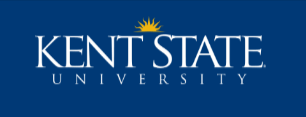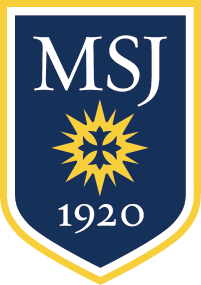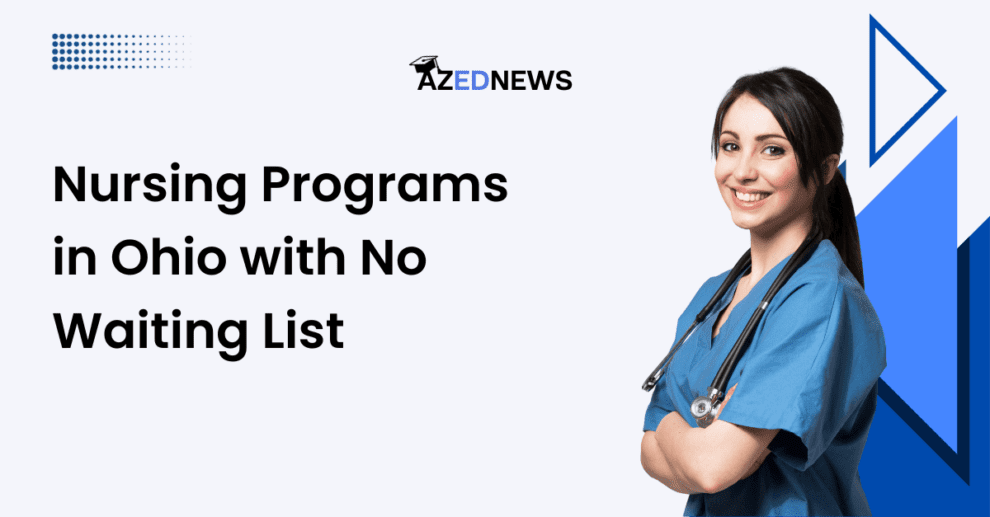If you’re someone eager to pursue a nursing education without encountering enrollment delays, then nursing programs in Ohio with no waiting lists can offer significant benefits. These programs enable you to commence your studies promptly, bypassing potential waiting periods that often accompany high-demand programs.
Table of Contents
Enrolling in a nursing programs in Ohio with no waiting list offers several advantages to the students. First of all, you can initiate your nursing education without any delays, allowing you to commence your journey toward a nursing degree and career more efficiently.
Secondly, the nursing programs in Ohio with no waiting list tend to be less competitive compared to traditional programs. The absence of a waitlist means students are not in competition for a limited number of available spots. This can eliminate the stress of the admissions process, which provides a more accessible pathway for students.
Additionally going for a nursing programs in Ohio with no waiting list can result in time and cost savings. Traditional programs with waitlists often extend the duration of your education. These can delay your entry into the workforce and increase overall costs. Opting for Nursing programs in Ohio with no waiting list allows you to swiftly earn your degree, kickstarting your nursing career sooner and resulting in significant time and financial savings.
Top 22 Nursing Programs in Ohio with No Waiting List
Finding nursing programs in Ohio with no waiting list can be a challenge, especially with so many options available. Below, we’ve highlighted some of these schools in Ohio. If you’re considering pursuing nursing programs in Michigan without waitlists, we’ve also compiled a list to ease your search for the right medical education opportunity.
1. Case Western Reserve University

The Frances Payne Bolton School of Nursing at Case Western Reserve University stands out for its innovative approach. It was among the pioneering institutions to introduce nursing programs such as acute care nurse practitioner, gerontological nursing, and doctor of nursing practice.
The school is situated in the vibrant University Circle and offers both a traditional four-year BSN degree and a unique direct-entry MSN pathway. Boasting a pass rate as high as 97%, BSN graduates benefit from the school’s seven centers of excellence that provide abundant nursing opportunities and experiences.
2. Ohio State University

Twice recognized as a Center of Excellence by the National League for Nursing, the Ohio State’s College of Nursing has educated over 12,000 nurses. Emphasizing research and patient-centered practice, the college offers top-ranking programs like an online MSN program. Achieving a remarkable first-time NCLEX pass rate of 94% over the past decade, the college consistently produces 200-230 graduates annually from its four-year BSN program.
3. Mount Carmel College of Nursing

Enrolling over 1,000 students, Mount Carmel College of Nursing is home to one of the largest baccalaureate nursing programs in Ohio with no waiting list. With a focus on ethnic diversity, small class sizes, and personal faculty attention, the college sees 200+ BSN graduates each year boasting a 90% NCLEX pass rate over the past decade. The college’s proximity to Mount Carmel West Hospital ensures hands-on learning experiences for students.
4. Kent State University

Kent State University keeps addressing Ohio’s healthcare needs and offers nursing programs at multiple sites. Graduating 200-250 nurses annually from the ADN program and 400-500 from the prelicensure BSN program the Kent State students consistently excel in the NCLEX licensure exam. The university also provides diverse online and hybrid tracks in the MSN program and showcases a 99.6% job placement rate within six months of graduation.
5. Ashland University
The Dwight Schar College of Nursing & Health Sciences at Ashland University offers a multitude of nursing programs, catering to various entry points and specializations. Noteworthy achievements include a 91% NCLEX pass rate for prelicensure BSN students over the past decade. With both undergraduate and graduate options offered online, Ashland University provides flexibility and diverse learning paths.
6. Xavier University
Xavier University’s nursing program, endorsed by the American Holistic Nursing Association, emphasizes a holistic approach. Faculty with diverse specialties, including epidemiology and natural health, contribute to the unique learning environment. Graduates consistently perform well on licensure exams, with a perfect 100% NCLEX pass rate for the accelerated BSN class in 2018 and the direct entry MSN program in 2017 and 2019.
7. Ursuline College

Ursuline College, with its Breen School of Nursing, maintains a tradition of educating female nurses. Offering various programs, including BSN, MSN, and DNP, the school provides five distinct MSN tracks. Approximately 75-100 students graduate annually from the four-year BSN program, maintaining a solid NCLEX exam pass rate of 88% over the past decade.
8. Walsh University
The Gary and Linda Byers School of Nursing at Walsh University distinguishes itself with global learning experiences and proximity to renowned hospitals. Graduating 60-90 students annually from traditional and fast-track BSN programs, the school boasts an impressive 92% first-time NCLEX pass rate over the past decade. Specialty tracks across MSN, post-graduate certificate, and DNP programs enhance the curriculum.
9. University of Cincinnati
The College of Nursing at the University of Cincinnati provides diverse nursing programs in Ohio with no waiting list catering to different academic levels. Offering two pathways to the BSN, the university stands out with a traditional prelicensure program and an online RN-to-BSN completion program. Graduating 200-250 new nurses annually, the prelicensure program maintains an 85% first-time NCLEX pass rate over the past decade.
At the graduate level, UC offers entry points for the MSN degree and a range of specialization options, including nurse-midwifery and various NP tracks. Additionally, the university provides DNP and nursing Ph.D. programs, with the option for DNP students to earn a nurse education certificate through additional online courses.
10. Otterbein University

Otterbein University boasts a rich history of equality and inclusion, being the first in the nation to include women as both faculty and students. The Department of Nursing’s flagship BSN program prepares students for diverse healthcare settings. Graduating 40-60 students annually, the BSN program has achieved an impressive 95% first-time NCLEX pass rate since 2016. Otterbein also offers graduate nursing programs, including MSN and DNP degrees, with concentrations such as family nurse practitioners and psychiatric-mental health nurse practitioners.
11. Franciscan University of Steubenville

Franciscan University’s nursing program aligns with Christian values, emphasizing holistic health-oriented care. Offering a traditional BSN, an RN-to-BSN articulation option, and an MSN program with a family nurse practitioner specialization, the university has maintained small BSN graduating classes with an 89% NCLEX pass rate over the past decade. Students benefit from access to a well-equipped Nursing Simulation Laboratory incorporating cutting-edge Laerdal human patient simulator technology.
12. Ohio University

The BSN program at Ohio University, the fastest-growing in the College of Health Sciences and Professions, serves the mission to upgrade Appalachian Ohio health services. With the only CCNE-accredited four-year program in southeast Ohio, the university offers both BSN and ADN programs across various campuses.
At the graduate level, Ohio University provides an online MSN degree with tracks for nurse educators, leaders, and practitioners, including NP options. The university also offers a DNP program with concentrations in advanced clinical or executive practice.
13. Mount St. Joseph University

With over eighty years of experience, the Department of Nursing at Mount St. Joseph University offers a range of undergraduate and graduate programs. The MAGELIN program for second-degree students maintains an 88% first-time NCLEX pass rate. Prelicensure BSN students consistently pass the NCLEX exam at an 85% rate on their first attempt. The university also provides traditional MSN and DNP programs for registered nurses.
14. Wright State University
Enrolling almost 700 undergraduate and 220 graduate nursing students, the Wright State University-Miami Valley College of Nursing and Health boasts a large BSN class graduating 150-200 students annually. Achieving NCLEX pass rates as high as 97.8% in recent years, the college focuses on evidence-based pedagogy through initiatives like the Wright Nurse Project. Students benefit from international immersion opportunities, including a study abroad program in the United Kingdom and global health initiatives in Tanzania.
15. Capital University

Capital University offers a spectrum of nursing programs for newcomers and those seeking advanced degrees. With traditional and accelerated BSN programs, an MSN degree with various pathways and specializations, and post-master certificates, the university caters to diverse nursing aspirations. Graduating 70-100 students annually, Capital maintains a solid 88% NCLEX pass rate. The MSN program provides standalone and joint degree options with concentrations like administration, nursing education, and legal studies.
16. Ohio Northern University

Ohio Northern University offers a comprehensive four-year prelicensure BSN program with clinical experiences starting in sophomore year. With an impressive 8:1 student-to-faculty clinical ratio, the university graduates 20-30 prelicensure BSN candidates annually.
Boasting a remarkable 96% first-time pass rate on the NCLEX exam over the past decade, classes of 2018 and 2020 achieved a perfect 100% pass rate. ONU students benefit from state-of-the-art laboratory facilities and diverse healthcare settings, with 98.6% of nursing majors either gainfully employed or enrolled in graduate school within six months of graduation in recent years.
17. Malone University

Malone University’s School of Nursing & Health Sciences, with over twenty years of experience, incorporates evidence-based practice, cultural competence, and simulation training into its nursing programs. Offering a four-year BSN, an RN-to-BSN degree completion pathway, and an MSN degree with specialty tracks, the school ensures students receive one-on-one support.
The four-year BSN program graduates approximately twenty-five new nurses annually, maintaining a perfect 100% first-time NCLEX pass rate in 2018 and 2019.
18. Cedarville University

Cedarville University’s School of Nursing provides unique programs, including traditional and three-year BSN programs, along with a cross-cultural nursing minor. Preparing students to work with cross-cultural populations, the university graduates almost 100 BSN students annually, maintaining an 87% NCLEX pass rate over the past decade. Graduate options include an MSN degree with tracks like family nurse practitioner and standalone certificate programs.
19. University of Akron
The University of Akron School of Nursing, with over fifty years of experience, offers diverse pathways to a BSN degree, including traditional prelicensure, accelerated second degree, LPN-to-BSN, and RN-to-BSN. Graduating approximately 200 prelicensure BSN candidates annually, the school maintains a solid 89% NCLEX pass rate. Graduate programs encompass an MSN degree with five NP tracks, a post-baccalaureate DNP in nurse anesthesia, and a hybrid post-master’s DNP.
20. University of Toledo

The UT College of Nursing collaborates with ProMedica, offering innovative educational programs and diverse clinical experiences. UT provides a traditional BSN degree, graduating 150-200 students annually with an 84% NCLEX pass rate over the past decade. The college also offers a graduate-entry clinical nurse leader program and MSN and DNP programs with four distinct nurse practitioner specializations.
21. Baldwin Wallace University

Baldwin Wallace University’s School of Health Sciences features an accelerated BSN program for individuals with a non-nursing bachelor’s degree. Graduating 20-40 BSN students annually, the university achieves a remarkable 94% first-time pass rate on the NCLEX licensure examination.
22. Chamberlain University

Chamberlain University’s Cleveland and Columbus campuses offer an accelerated BSN program completed in as little as three years. With hands-on experience in the SIMCARE Center and onsite clinical settings, graduates from both campuses perform well on the NCLEX-RN licensure exam. Columbus graduates achieve a 91% NCLEX pass rate, while their Cleveland counterparts average an 84% pass rate.
FAQS
1. What is the quickest route to become a nurse?
Going for a two-year ADN program is the swiftest path to becoming a registered nurse (RN). Previously, RN nursing diploma programs served as the fastest route, but now, many hospitals collaborate with community colleges to offer ADN programs.
2. Which is the briefest nursing program in Ohio?
Baldwin Wallace University in Berea offers the Accelerated Bachelor of Science in Nursing program, allowing students to embark on a fulfilling nursing career in as little as 15 months.
3. How challenging is it to gain admission to Ohio University’s nursing program?
Securing admission to the BS1221 is competitive, and successful completion of the pre-BSN major (ND1220) does not guarantee entry into the BSN program. Meeting a minimum college GPA of 2.75 and fulfilling other criteria is necessary for consideration.
4. Is there a demand for nurses in Ohio?
Yes, Ohio is facing a nursing shortage, leading to a patient care crisis. State lawmakers are addressing this through the Nurse Workforce and Safe Patient Care Act, aiming to establish staffing ratios and offer student incentives. While some doubt that improved staffing and pay alone will resolve the shortage, it is a step toward addressing the issue.
Conclusion
Usually, students who are looking to pursue nursing programs want a college or nursing programs in Ohio with no waiting list. This will increase their chances of getting admission as well as eliminate the hassle procedure of admissions. We have researched and shortlisted some of the nursing programs in Ohio with no waiting list.












Add Comment